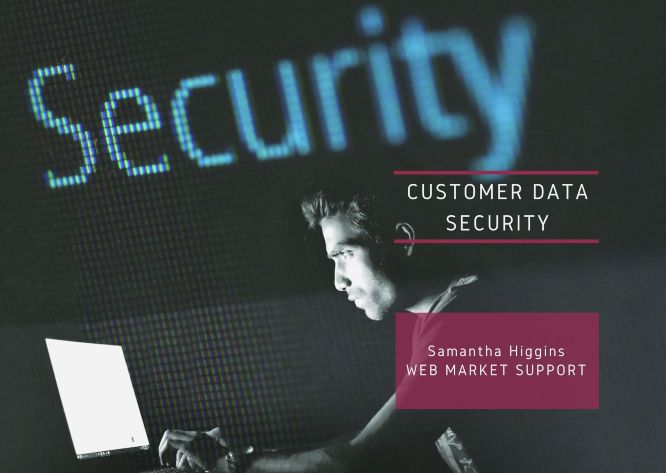According to research, 79% of consumers are concerned about the security of their data and privacy. As a business owner, it’s your responsibility to make sure your customer’s data is beyond the grasp of cybercriminals.
Being able to do that effectively can both save you from massive financial losses and boost your customer’s confidence, trust, and loyalty.
Keep reading to discover some of the best ways to make sure your customer’s information remains safe and secure.
How To Make Sure Your Customers’ Info Stays Secure

Banner created with Canva
Boost security on your physical data and computers
Like most small businesses, you might be taking measures to protect your digital data, but forget to address your physical data and the electronic devices that you use to store this information. To keep your physical data and electronics secure, you should do the following:
Destroy the data sources before dumping them. There are many data breaches that occur out of the dumpster, and that’s why it’s always advisable to recycle files before discarding them. Similarly, you should wipe your computer’s drive clean before decommissioning the machine.
Keep only what you need. Assess all the kinds of data you have and determine what is extremely necessary to keep; discard the rest. For instance, you can keep customer names but purge personal information that is irrelevant to you, such as their birth dates.
Lock up hard copies, and protect portable media and cell phones.
If you have any files or papers containing your customer’s data or any related information, store them behind a locked door, and add extra measures, such as a numeric keypad and biometric verification system.
Ensure all the data saved on your USB drives is encrypted, and that the company’s cell phones have encryption software to make sure your network and customer’s data are safe.
%
Consumers that are concerned about the security of their data and privacy
Monitor your customer’s data
Next, monitor your customer’s data for possible threats. Take some time to understand the data you hold and where you have stored it.
You cannot keep your data safe if you don’t really know where it is. So, you need to make an effort of monitoring your customer’s data to stay ahead of possible cyber-attacks.
You can think of it as playing the role of a watch guard who ensures their data is secure.
Test your systems frequently
If your system was hacked today, how would you know? How exactly would you manage the problem and control the damage?
According to Forbes, one of the best ways of combating cybercriminals effectively is employing the same determined approach as theirs, which includes emulating hackers to gauge your systems’ capacity.
Start by coming up with a plan to test your system regularly. You could have program spot checks or even conduct extensive mock attacks to have a clear picture of your cybersecurity system’s health, and how your employees would respond to an attack.
Properly planned and executed testing measures can help you highlight issues and weaknesses, and enable you to make corrections and changes in good time – before a real attack.
Use VPN
To some extent, protecting your customer’s data requires you to take extra measures to protect your network especially if your employees are working remotely.
A Virtual Private Network (VPN) is one of the best tools you can have to protect your organization and its data from data breaches.
If you have remote employees, you need to establish a remote access VPN so that your employees can enter your business network while still making sure your business data is secure.
As a cybersecurity solution, a VPN can help your teams conduct secure communications and prevent cyber-attacks seeking to collect sensitive customer data. If your company is larger, you can extend your VPN router’s capabilities by getting a VPN concentrator, a device that creates and manages many VPN connections remotely.
Educate your employees
It’s possible your employees are a weak link between your customer’s data and a data breach. You need to train your employees on the best ways to secure company data.
They should know how to handle the computers, the disposal of data, the company’s cell phones, and everything else that can leak your customer’s data.
Make sure they know how to encrypt files and save passwords, as well as other measures that can keep your data more secure in their hands.
Conclusion
Today, it’s relatively simple to secure your customer’s data.
To get started, boost security on your physical data and computers, monitor the data, test your systems frequently, use VPNs and educate your employees.

Samantha Higgins
Professional Writer
Samantha Higgins is a professional writer with a passion for research, observation, and innovation. She is nurturing a growing family of twin boys in Portland, Oregon with her husband. She loves kayaking and reading creative non-fiction. If you are looking into getting a VPN Concentrator consider looking into one from Mako Networks.

















0 Comments